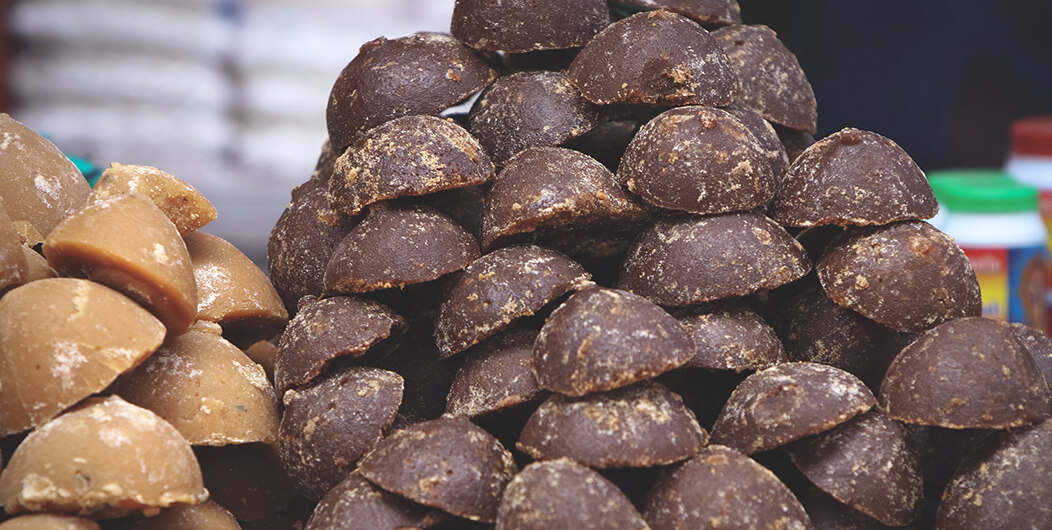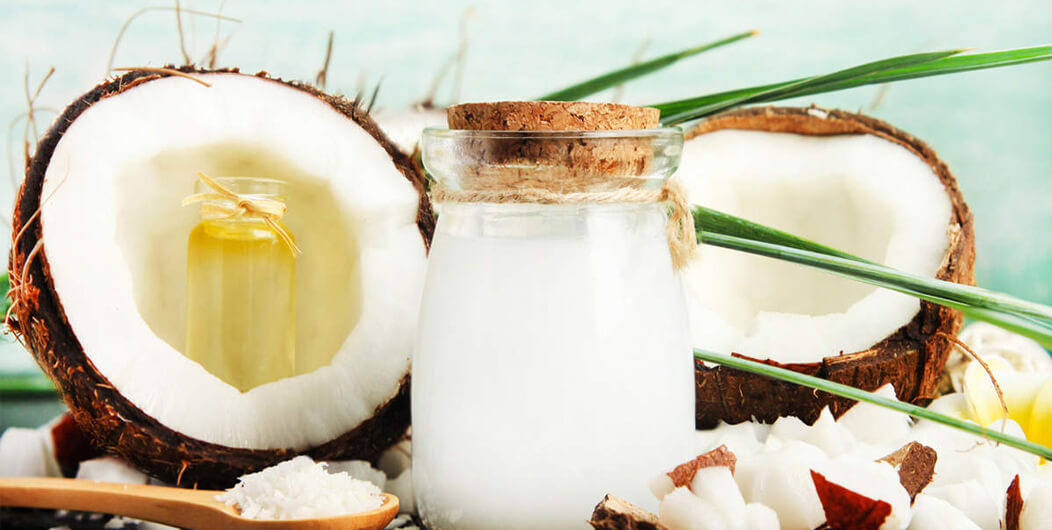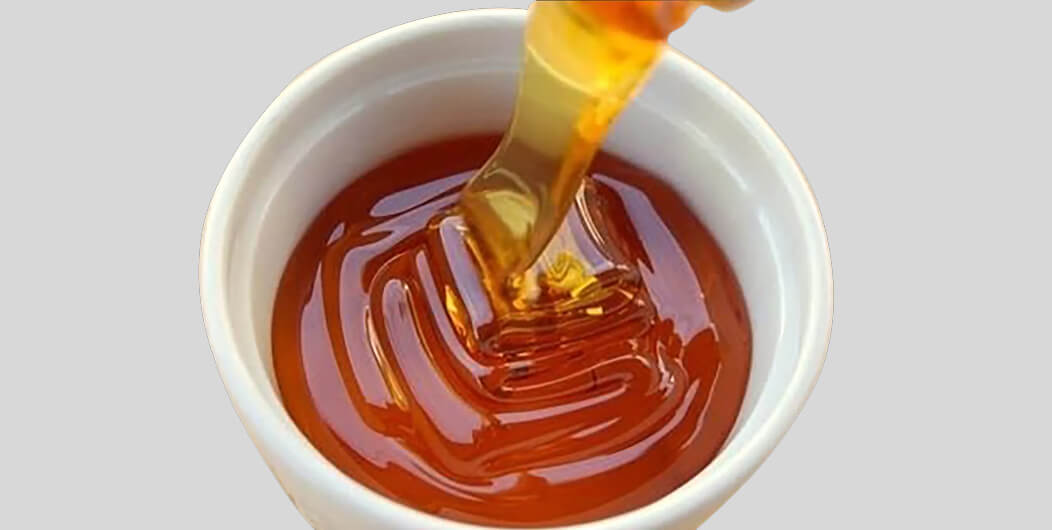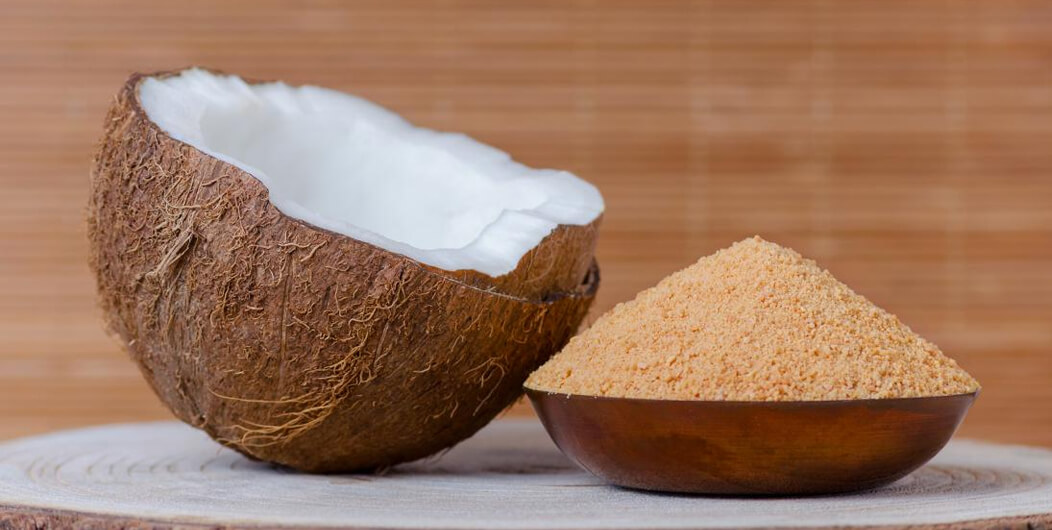
| Coconut Jaggery | Coconut Vinegar | Coconut Treacle | Coconut Sugar |
Coconut sap is a product of the coconut flower. It is extracted through a process called ‘tapping’ which involves snipping off the stem of the coconut flower and bending it into a vessel letting the sap slowly drip into it.
The sweet translucent liquid extracted this way is used to produce many products including jaggery, vinegar, syrup, sugar, and treacle. A tree that is used to collect sap, is called a “Sap tree” since it no longer produces coconuts. Yet, it will continue to produce flowers. This does not mean sapping is a harmful act since the tree is still alive and used for many other purposes.
Toddy tapping or collecting the coconut sap is a highly specialised skill that demands a nimble hand and steady feet. Trees used for sap extraction are usually very old. The nut production capability of most of these trees is low compared to younger trees.
The tapping process does not involve any high-tech machinery. It only involves a dextrous individual and a couple of tools. An individual tapper climbs up the tree in the morning and evening. If there is more than one tree to be tapped, a tapper would travel from one tree to another using rope bridges connecting the trees.
According to tappers, a coconut tree that is being tapped has the potential to produce sap continuously for twenty years and the collected sap is used to produce a range of sweet and zesty food and beverages.

Coconut jaggery is one of the main coconut sap-based products that are frequently used in South-East Asia. It is made using coconut sap which is strained and boiled. After reaching a consistent thickness, the sweet liquid is transferred to coconut shell moulds.
Within these shells, the thickened sap cools down and crystallizes into jaggery. Coconut jaggery is a rich source of magnesium and iron. This is not your usual cup of sucrose due to its richness in potassium and calcium components. Coconut jaggery produced in Sri Lanka does not contain any artificial substances or nutrients and is widely
The ingredients in coconut jaggery activate the digestive enzymes in the human body. As a result, it aids the proper digestion of food helping to overcome conditions such as constipation.
Jaggery also acts as a natural body cleanser. It reduces the workload of the liver helping it to flush out harmful toxins from the body and liver. Coconut jaggery is rich in antioxidants and minerals such as zinc and selenium. These components combine to prevent damage caused by free radicals. Coconut jaggery consumption will further support improvements in the haemoglobin count in the blood.
Consuming jaggery-mixed warm water can help with reducing cough and cold symptoms. The same benefit can be enjoyed by adding a bit of jaggery to tea as an alternative to sugar. It produces heat inside the body. As a result, most individuals consume coconut jaggery-based hot beverages during the winter and rainy seasons.

Coconut vinegar is one of the highly demanded coconut sap-based products in the global market at the moment. This acetic food additive adds flavour and the right nutritional benefits to the food ingredients it is mixed with. Sri Lankan coconut vinegar is made using two special methods of production.
The first process involves alcohol fermentation where yeasts change natural sugars in coconut sap to alcohol under controlled conditions. The second process takes place when a group of bacteria called “Acetobacter” convert the portion of the alcohol to acid. This is called acidic fermentation that forms vinegar.
When compared to apple cider vinegar, coconut vinegar has a cloudy white appearance and a milder taste. Coconut vinegar is also rich in vitamin C and potassium and provides the consumer with a range of polyphenols, which are beneficial plant compounds that aid protection against conditions such as diabetes, and heart disease.
Coconut vinegar can aid in weight loss. It contains acetic acid. A compound that helps the body to reduce hunger pangs and feel full for longer than usual. According to studies, acetic acid can help the system to reduce fat storage by encouraging fast metabolism. With zero calories or sugar mixing, coconut vinegar with your meals can result in you consuming up to 200 fewer calories within a day.
Potassium is a mineral that helps to reduce blood pressure. As a result, it is also connected to a reduced risk of heart diseases and strokes. Coconut vinegar contains high amounts of potassium that is passed down by the nutrients present in coconut sap. Vinegar consumption reduces triglyceride and LDL cholesterol, also known as bad cholesterol. Its contribution towards a healthy heart does not stop there. It is further supported by coconut vinegar’s anti-inflammatory properties.
Just like coconut jaggery, coconut vinegar supports healthy digestion. This is because, both the products originate from coconut sap, which is fermented giving rise to probiotics that are beneficial for gut health. The acetic acid present in vinegar is another component that supports this cause since it helps to fight off viruses and bacteria.
It is also a good fighting agent against E.coli bacteria, which is well known for food poisoning. Other than using vinegar in food, it can be used to clean food. According to a study, this method helps to reduce bacteria in food by 90% to 95%.

Coconut treacle is a delicious natural sweetener made using coconut sap. After the sap is collected, it is boiled and concentrated to produce a thick brown coloured concentration known as coconut treacle. It is a great alternative for common sugars that are considered to be unhealthy for daily consumption.
Treacle made using Sri Lankan coconuts have a unique flavour. As a result, the product has a high demand in the Western market When compared to regular sugar, this coconut treacle contains a lower GI. It further contains vitamin C, magnesium, calcium, potassium, zinc, iron, and copper. Coconut syrup is also a rich source of antioxidants and phytonutrients.
Sri Lankans mostly prefer treacle on curd, which is a very famous traditional dessert consumed in most parts of the country. It is further used to make other desserts and sweets. It is also known for the great taste it delivers as a topping on pancakes, waffles, and crepes as well as ice cream and can also be mixed with your morning coffee.
Coconut treacle is a low glycemic index, the standard measurement of blood glucose level 2 to 3 hours after the consumption of coconut treacle is only 35, much lower compared to other sugar sources.
Amino acids are considered the building blocks of the human body. They contribute to a lot of physiological processes such as recovery, muscle hypertrophy, fat loss, and strength gains. Coconut treacle is also a rich source of amino acids. Just like other coconut sap-based products, coconut treacle contains 17 essential amino acids and minerals. The vitamin content of the coconut treacle mainly consists of vitamin C, vitamin B1, B2, B3, and B6. It further contains fatty chain acids that are useful for energy generation inside the body.

Coconut sugar is a natural sugar made using coconut palm sap and is used widely as an alternative to common sugar. Making coconut sugar is only a two-step process. First, the sap liquid is collected through a cut made on the palm flower. The sap is then subjected to heat, where it is kept until the water has almost evaporated.
The final result of this process is brown coloured sugar. The particle size of coconut sugar is very small compared to most sugars. The demand for coconut sugar started to rise within the past few years after a majority started to identify the unhealthy effects of normal sugars.
Most of the common sugars and sweeteners available in the market consist of added flavours and other chemicals. This makes coconut sugar a perfect alternative since it does not require any of those additions, Most consumers confuse coconut sugar with palm sugar since they both are the same colour and granular size. Palm sugar originates from another tree.
The Glycemic Index is a measurement that evaluates carbohydrate-containing foods and their impact on blood sugar and glucose levels. High GI foods can cause blood sugar spikes and toll insulin levels in the body. Coconut sugar positions itself at a low spot in the GI count. When table sugar ranks in the range between 60 - 65, coconut sugar is ranked at 35. Insulin, which is a fibre present in coconut sugar, slows down glucose absorption. As a result, it aids in lowering blood sugar levels.
Just like other sugars, coconut sugar also contains calories. It carries 16 calories and 4 carbohydrates per teaspoon. But when compared to regular white sugar, white sugar contains empty calories. They do not have any nutritional value. Whereas, coconut sugar is high in potassium, calcium, and antioxidants.
Fructose is a sugar variant that converts into fats inside our body. This conversion is quick. This variant cannot be broken down easily. It can only be handled by the liver. Once it reaches the liver, it melts down to form triglycerides, which is a form of fat that takes part in creating energy. Coconut sugar contains 20% - 30% fructose providing the body with more energy-generating components
Sri Lanka is the fourth largest exporter of fresh and dried coconut products in the world with popular exports including desiccated coconut, brown fibre, virgin coconut oil, and coconut water which are available through a number of exporters.
Coconut & Coconut based Products
Info
Directory
eMARKETPLACE
Coconut Peat Products
Directory
eMARKETPLACE
Coconut Ekel products
Directory
eMARKETPLACE
Coconut Water Products
Directory
eMARKETPLACE
Coconut Kernel Products
Directory
eMARKETPLACE
Coconut Fiber Products
Directory
eMARKETPLACE
Coconut Shell Products
Directory
eMARKETPLACE